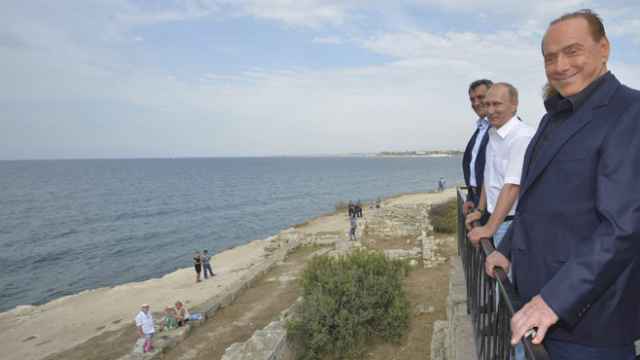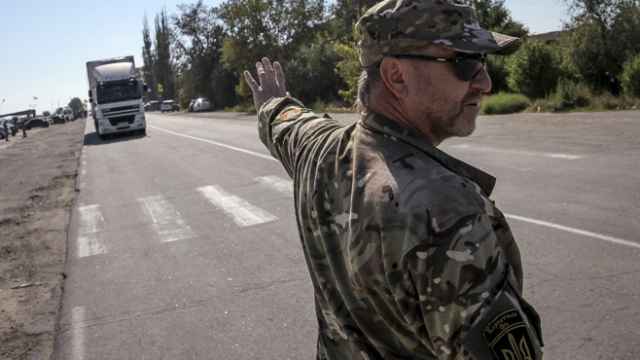A Ukrainian man spilled a cup of coffee on Crimea's Minister of Information Dmitry Polonsky, during a meeting in Warsaw on Thursday, and the incident drew a flurry of comments from high-level officials and received coverage by major news agencies and television channels in Russia and Ukraine.
Polonsky called the splashing of his suit with coffee a "provocation," while Crimea's pro-Moscow Krym Inform news agency accused the Ukrainian ambassador to Poland of having "personally organized the 'special operation' on dousing Crimea's Deputy Prime Minister Dmitry Polonsky with hot coffee."
Krym Inform did not cite any evidence for its allegation, but cited Polonsky as saying the young man had been standing near the Ukrainian ambassador Andriy Deshchytsia, and a Ukrainian television crew prior to the incident.
Deshchytsia said the man was a Ukrainian student studying in Warsaw, and suggested the spill was an intentional act of protest against Russia's annexation of Crimea, Ukraine's 112 television reported.
Having spilled the coffee, the young man turned and walked away, while Polonsky, looking irked, exclaimed: "You glad? You happy?" according to video footage broadcast by Ukraine's TSN television. He used the familiar form of address.
The pro-Russian Krym Inform added some embellishments in its article, quoting him as saying: "Young man, are you pleased with the action that demeans you?" and using the formal form of address.
The coffee incident was just one in a series of scandals marking Polonsky's visit to the Polish capital for a conference on human rights in Crimea held by the Organization for Security and Cooperation in Europe (OSCE).
Polonsky is subject to Western sanctions over Russia's involvement in the Ukraine conflict, and is banned from traveling to European Union nations, Poland's Foreign Ministry spokesman Marcin Wojciechowski said, Russia's RIA Novosti news agency reported.
Poland's Foreign Minister Grzegorz Schetyna said Polonsky managed to cross the border into Poland because the transliteration of his Russian name into the Latin script in his passport differed from that on the list of sanctioned individuals, TSN television reported.
"Sometimes these things happen," Schetyna was quoted as saying. "This was one of those cases. The name was changed. This man resorted to deception. The sanctions list and the passport had different names."
Former residents of Crimea who fled the peninsula after Russia's annexation were outraged by Polonsky's presence at the conference, TSN reported.
"I am shocked," the head of the Crimea foundation in Poland, Riza Asanov, was quoted as saying. "A person from the occupational authority, the person whom we consider a Goebbels, has shown up here. We are all in shock."
Polonsky's application to participate in the conference identified him not as a minister within Crimea's Russian administration, but as a representative of the peninsula's ethnic Russian community, TSN reported.
A Message from The Moscow Times:
Dear readers,
We are facing unprecedented challenges. Russia's Prosecutor General's Office has designated The Moscow Times as an "undesirable" organization, criminalizing our work and putting our staff at risk of prosecution. This follows our earlier unjust labeling as a "foreign agent."
These actions are direct attempts to silence independent journalism in Russia. The authorities claim our work "discredits the decisions of the Russian leadership." We see things differently: we strive to provide accurate, unbiased reporting on Russia.
We, the journalists of The Moscow Times, refuse to be silenced. But to continue our work, we need your help.
Your support, no matter how small, makes a world of difference. If you can, please support us monthly starting from just $2. It's quick to set up, and every contribution makes a significant impact.
By supporting The Moscow Times, you're defending open, independent journalism in the face of repression. Thank you for standing with us.
Remind me later.






